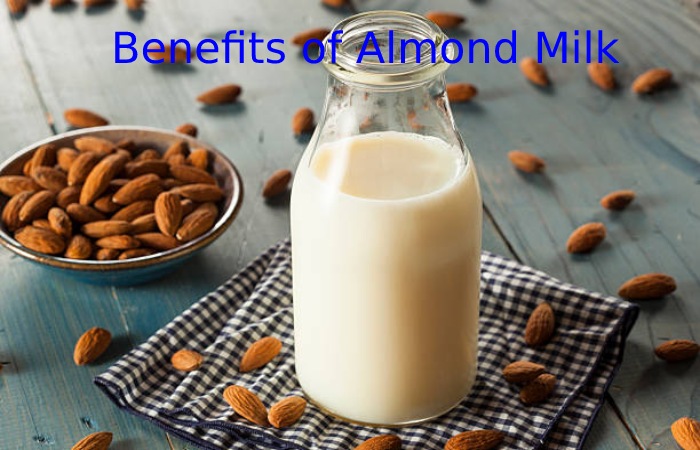Almond milk is the most general plant-based milk in the United States. Although it is rich in healthy nutrients, it is thinned out and lacks more fiber than whole almonds.
Table of Contents
What is Almond Milk?

Almond milk is made by mixing the almonds with water and then filtering the mixture to remove the solids. You can also prepare it by adding water to the almond butter.
It has a pleasant nutty taste and a creamy texture similar to regular milk. For this reason, it is a popular choice for people on a vegan diet and those with allergies or milk intolerance.
Almond milk is found in most supermarkets, usually the health food department. It is also elementary to prepare at home-based.
Commercial almond milk originates in a variety of brands and flavors. Almond milk with no added sugar is healthier.
Most brands also offer milk fortified with vitamins, minerals, or proteins. However, without consuming dairy products, choosing products fortified with calcium can be beneficial.
There is a link between whole almonds and various health benefits controlled studies, but many may not apply to almond milk.
Benefits of Almond Milk
significant health benefits of drinking almond milk.
1. It’s nutritious
While almond milk isn’t as nutritious as cow’s milk, fortified products come pretty close.
It often has added vitamin D, calcium, and protein, making it more similar in nutritional value to regular milk.
Though, almond milk is naturally rich in various vitamins and minerals, especially vitamin E.
For comparison, the following table shows the amounts of some nutrients, vitamins, and minerals in one cup of commercial fortified almond milk and low-fat cow’s milk along with some daily values (DV).
- Calories 39.3 102
- Egg white 1.05 g 8.22 g
- Fat 2.52 g 2.37 g
- Carbohydrates 3.43 g 12.2 g
- Vitamin E more than 100% of the DV 0% of the DV
- Football 37% of the DV 23% of the DV
- Potassium 4% of the DV 8% of the DV
- Magnesium 4% of the DV 6% of the DV
- Riboflavin 2% of the DV 35% of the DV
- Correspondence of 2% of the DV with 19% of the DV
The build does not hold some minerals in almond profit and milk. In part, this is because almonds contain phytic acid, an anti-nutrient that reduces the absorption of iron, zinc, and magnesium. Then almond milk lacks many nutrients; it is not suitable as a substitute for baby milk.
2. It’s Low in Calories
Half the calories of one cup of skimmed milk. However, It is not just almond milk. Homemade It and certain brands can have many calories depending on how many almonds per cup. Also, some products contain added sugars that should avoid for maximum health benefits.
3. Unsweetened Almond Milk Does not Increase Body Fluid Sugar
Numerous It on the shop load with additional sugar. On the other hand, unsweetened It is a low-carb drink of less than 2% carbohydrates or 3.43g of carbohydrates in 1 cup. In evaluation, low-fat cow’s milk contains 5% carbohydrates, for 12g in 1 cup.
Almond milk is also high in overweight and protein about its carbohydrate content. Because of this, it does not cause blood sugar levels to rise so that people can take it with diabetes and those on a low-carbohydrate diet.
4. Does not Contain Dairy Products
Almond milk does not cover cow’s It or other animal products, so it is an excellent option for people on a vegan diet and lactose intolerance or It allergy.
Many people cannot tolerate milk sugar (lactose) and cannot digest it completely. Undigested lactose enters the colon, fermented by resident bacteria, causing gas, gas, diarrhea, and excessive discomfort in intolerant people.
Since almond milk is dairy-free, it does not contain lactose and is a suitable It substitute for lactose intolerance.
5. Fortified Almond Milk Can Strengthen Bones
Dairy products are an irritating source of calcium in food. Indifference, almonds are a poor source of this nutrient.
The manufacturers often fortified with calcium to kind It like natural milk. For example, one cup of commercial can contain 37% or more of your daily needs, depending on the type and brand.
In comparison, the calcium satisfied in a cup of cow’s milk can cover around 23% of the daily requirement, depending on the variety and brand.
Therefore, fortified It is an excellent source of calcium for people who do not consume dairy products, such as vegans and those with lactose intolerance or milk allergy.
Calcium is essential for building and upholding healthy bones. Because of this, adequate calcium intake reduces the risk of osteoporosis, a disease associated with weak bones and fractures.
6. It Can Reduce the Danger of Heart Disease
Observational studies show that regular nuts were eating links to a lower risk of heart disease. It is because they are high in healthy fats. It contains 1% of its weight in oil, almost 90% of which is unsaturated. Research has linked oleic acid, the primary fatty acid in almond oil, to beneficial changes in blood lipids.
A study of healthy adults showed that consuming 66g of almonds or almond oil daily for 6 weeks reduced their levels of low-density lipoprotein, or “bad” cholesterol, by 6% and triglycerides by 14%. But, unfortunately,
While about 50% of the calories in It arise from fat, it is generally a low-fat product and is unlikely to have a significant impact on your blood fat profile. It is responsible for many of the health benefits of almonds. For example, these compounds have anti-inflammatory and antioxidant properties that are good for heart health.
Conclusion
Almond milk is rich in vitamin E and contains healthy fats. Drinking can be good for your heart. It is naturally rich in various vitamins and minerals, especially vitamin E.
